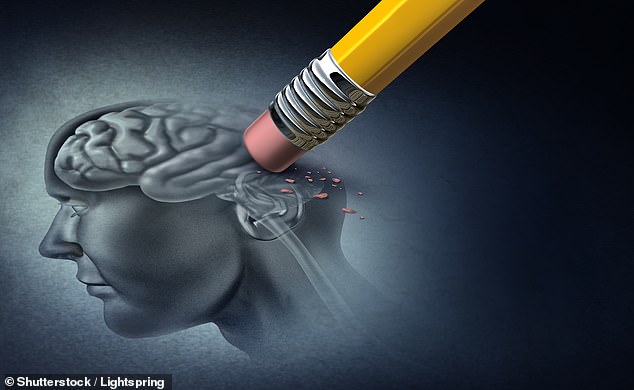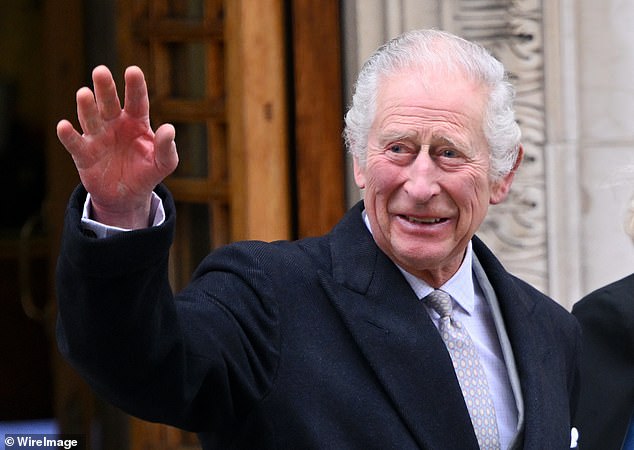Are you worried that you could get Alzheimer’s from a loved one? Read on for MAX PEMBERTON’s assessment of a recent study showing it can be transmitted between people…
A diagnosis of Alzheimer’s disease brings upset, stress and worry. All too often I have seen the fear in patients’ eyes when the news is delivered and in an instant the peaceful old age they once imagined is ripped away from them.
But it is also extremely difficult for their family. The roles are suddenly changed: beloved spouses become full-time caregivers, while adult children face a future of worry for a parent who may even forget their name.
How much more terrifying would it be if they thought they could “inherit” Alzheimer’s from their loved one?
Caring for a patient with dementia is difficult enough. Add to this the extraordinary idea that they could be contagious, and the work that thousands of husbands, wives and other relatives in the UK, many of whom are elderly themselves, so selflessly undertake becomes a nightmare.
It conjures up a terrible vision of Alzheimer’s patients in permanent lockdown, shunned and isolated even by their loved ones. And yet the idea that this most hated and feared disease could spread among humans is exactly what the headlines last week seemed to suggest.
Alzheimer’s disease is a type of brain disorder that causes problems with memory, thinking and behavior (File Image)
Reports from research at University College London, which showed that a small group of patients had ‘contracted’ Alzheimer’s disease, caused alarm.
Understandably panicked at the thought that they might be getting it from their loved one, or might already have done so, several caregivers asked me what I knew about it.
What I told them is what I will tell you, and I will be clear from the start – and hopefully reassuring. The cases discussed in the study are terribly sad, but we can say categorically that it is not possible to “catch” Alzheimer’s disease by caring for someone with the condition.
So what did the research actually show? The research was carried out by neurologists from UCL’s Institute of Prion Diseases and published in the prestigious journal Nature Medicine.
It involved a handful of patients who had been given human growth hormone many years ago, when it was extracted from the pituitary gland in the brains of people who had donated their bodies to medical science.
The goal was to help children with small stature grow. But tragically, scientists discovered more than two decades ago that 80 of an estimated 1,848 children who received the shots between 1959 and 1985 had developed a rare form of dementia known as Creutzfeldt-Jakob disease (CJD). This is caused by a type of protein called a prion, the same protein involved in BSE (mad cow disease).

Dr. Max says: ‘It is not possible to ‘catch’ Alzheimer’s by caring for someone with the condition’ (File Image)
These proteins attach to proteins in the brain and cause them to change shape, resulting in brain cell death. Victims develop progressive problems with memory, thinking, movement and speech.
Twenty years ago, research revealed that some of the brain tissue from cadavers that had been used to make growth hormone was contaminated with prions. These had been passed on to the poor children who had been injected, causing them to develop CJD.
It was a terrible medical scandal in which doctors who had tried to help inadvertently harmed 80 young people whose lives were cut short.
But it has now been consigned to the history books. We no longer use growth hormone from dead bodies – it was banned in 1985 – but instead use a synthetic form.
And now comes this new study describing five poor souls who were given growth hormone from a cadaver but developed Alzheimer’s rather than CJD. This confused researchers because Alzheimer’s disease is not caused by prions.
Exactly what causes it is still hotly debated, but we do know that two proteins are involved. One is called amyloid beta, which forms plaques around brain cells, and the other is called tau, which forms tangles in brain cells.
To try to understand what happened, researchers managed, incredibly, to track down the original growth hormone samples used on the five patients, as these were still stored by the Department of Health and Social Care.
When they were analyzed, they found that they were not contaminated with prions, but contained amyloid beta proteins. The suggestion is that these acted like a prion and somehow caused more amyloid beta to be created, causing patients to develop Alzheimer’s disease.
Why did I go into so much detail? Because I wanted to show how specific the circumstances were and therefore how impossible it is today to ‘catch’ Alzheimer’s in normal life.
It’s a shame that so many people were stressed by the headlines, but the study itself could well help us understand more about Alzheimer’s, and anything that opens a window into its still-mysterious origins is valuable.
Dementia is an umbrella term for any condition that affects memory and thinking, and Alzheimer’s disease is the most common form in Britain, accounting for six in 10 cases. But despite it being so common and affecting so many people, we still don’t fully understand how it develops.
Rather than heralding a dystopian future where we all avoid Alzheimer’s patients for fear of developing the disease ourselves, this study could help scientists devise a treatment.
If you have a loved one with the condition, don’t stop visiting or caring. There is nothing to fear at all.
Due to King Charles’ recent operation, prostate problems are in the news. They affect many men, but research shows that we can reduce our risk by more than a third if we improve the condition by just three percent per year. Come on guys, let’s go! A little practice can make a big difference.

King Charles was treated for an enlarged prostate at the private London Clinic hospital in Harley Street
What Kate’s doctors will think
The doctors and nurses who cared for the Princess of Wales while she was in hospital can breathe a sigh of relief that she is home safely.
You may think it’s exciting to have a VIP patient. Haven’t you made it in your career when the great and the good come to you for wise advice about their health?

The Princess of Wales spent two weeks recovering in hospital after undergoing abdominal surgery last month
But actually it’s not nearly as fun and exciting as you might think. It’s incredibly stressful. Although I have never had a royal as a patient, I have had some high-profile and famous patients over the years. The level of control is intense. Your treatment plan may be studied and criticized by colleagues around the world.
Every mistake is analyzed and can even end up on the front page of a newspaper.
Colleagues can be jealous. Furthermore, you are not allowed to discuss the matter with anyone, even in the vaguest terms.
I’m obviously happy that Kate is doing well to be going home, and so are her doctors.
More than 23 million adults in Britain still don’t know how to perform CPR, the British Heart Foundation (BHF) revealed last week. CPR can literally save lives and is simple if you are trained, but if you are not taught how to do it, you risk watching someone die before your eyes.
I have performed CPR many times on people in the hospital and in a few public emergencies. Following the basic rules means you can give someone the best chance of survival.
According to the BHF, more than 30,000 people in Britain suffer out-of-hospital cardiac arrest every year, with fewer than one in ten surviving the disease. Providing CPR and using a defibrillator can more than double a person’s chance of survival. The BHF has simplified CPR to five basic steps:
- Check if there is a response. Shake the person’s shoulders vigorously and ask loudly if everything is okay.
- Call 999. If the person is unconscious and not breathing or breathing normally, begin CPR.
- If someone is with you, ask them to find a defibrillator.
- Start with chest compressions. With the heel of your hand, press down smoothly and firmly in the center of the chest at a rate of two per second. Try playing to the rhythm of Stayin’ Alive by the Bee Gees.
- Use a defibrillator as soon as possible. Follow the instructions carefully as you continue CPR.
I would encourage everyone to visit bhf.org.uk For more information.
